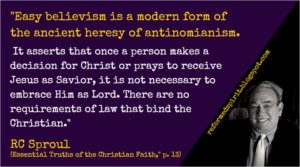1 Cor 11:23ff
Dr. James White:

 Article “Christian, Do You Love God’s Law?” by Dr. Sinclair Ferguson Original source here)
Article “Christian, Do You Love God’s Law?” by Dr. Sinclair Ferguson Original source here)
At a PGA Tour tournament in October 2015, Ben Crane disqualified himself after completing his second round. He did so at considerable financial cost. No matter—Crane believed the personal cost of not doing it would be greater (encouraged by a devotional article he had read that morning by Davis Love III, the distinguished former Ryder Cup captain).
Crane realized he had broken one of the more recondite rules of golf. If I followed the story rightly, while in a hazard looking for his ball, he leaned his club on a stone. He abandoned the ball, took the requisite penalty for doing so, played on, and finished his round. He would have made the Friday night cut comfortably; a very successful weekend financially beckoned. Then Ben Crane thought: “Should I have included a penalty for grounding my club in a hazard?” Sure enough (Rule 13.4a). So he disqualified himself.
(Got it? Hopefully, no readers will lie awake tonight now knowing the trophy was won illegally.)
Crane has been widely praised for his action. No avalanche of spiteful or demeaning attacks on cyberspace or hate mail for being narrow-minded. All honor to him. Intriguingly, no one seems to have said or written, “Ben Crane is such a legalist.”
No, we are not starting a new sports column this month. But how odd it is to see so much praise for his detailed attention to the rules of golf, and yet the opposite when it comes to the rules of life, the (much more straightforward) law of God, even in the church.
There is a problem somewhere.
The Problem
Neither Jesus nor Paul had a problem with the law. Paul wrote that his gospel of grace upholds and establishes the law (Rom. 3:31)—even God’s laws in their negative form, since the “grace of God . . . teaches us to say ‘No’” (Titus 2:11–12 NIV). And remember Jesus’ words in Matthew 5:17–19? Our attitude to the law is a litmus test of our relationship to the kingdom of God.
So what is the problem? The real problem is that we do not understand grace. If we did, we would also realize why John Newton, author of “Amazing Grace,” could write, “Ignorance of the nature and design of the law is at the bottom of most religious mistakes.”
There is a deep issue here. In Scripture, the person who understands grace loves law. (Incidentally, mere polemics against antinomianism can never produce this.)
Think again of Ben Crane. Why keep the complex rules of golf? Because you love the game. Something similar, but greater, is true of the believer. Love the Lord, and we will love His law—because it is His. All is rooted in this beautiful biblical simplicity.
Think of it in terms of three men and the three “stages” or “epochs” they represent: Adam, Moses, and Jesus.
Adam
At creation, God gave commandments. They expressed His will. And since He is a good, wise, loving, and generous God, His commandments are always for our best. He wants to be a Father to us.
As soon as God created man and woman as His image (Gen. 1:26–28—a hugely significant statement), He gave them statutes to follow (v. 29). The context here makes clear the rationale: He is Lord; they are His image. He made them to reflect Him. He is the cosmic Overlord, and they are the earthly under-lords. His goal is their mutual enjoyment of one another and creation in a communion of life (1:26–2:3). So, He has given them a start—a garden in Eden (2:7). He wants them to extend that garden to the ends of the earth, and to enjoy it as miniature creators, images imitating the great original Creator (1:28–29). Continue reading
 Article by Phil Johnson (original source here)
Article by Phil Johnson (original source here)
Antinomianism is one of those theological terms that is notoriously hard to pin down. It has an admittedly sinister sound, and when many people hear the term, they think it speaks of wantonly advocating sin (“Why not do evil that good may come?”—Romans 3:8). Indeed that kind of extreme antinomianism exists. It was the doctrine of Rasputin, for example.
But in normal theological discourse the term antinomianism usually refers to theoretical antinomianism. Theoretical antinomians don’t necessarily advocate extreme libertinism (or practical antinomianism). In fact, a great many theoretical antinomians are known for their advocacy of holiness. (And conversely, many who adhere to “Holiness doctrine” and various other perfectionist schemes are also theoretical antinomians.)
In totally non-technical terms, antinomianism is simply the view that Christians are not bound by any of the precepts of Moses’ law—moral, civil, ceremonial, or otherwise.
The Reformers saw three proper uses of the moral precepts of Moses’ law. Here’s a summary from Article VI of the Lutheran Formula of Concord (the “Epitome,” or short form):
“The Law has been given to men for three reasons: 1) to maintain external discipline against unruly and disobedient men, 2) to lead men to a knowledge of their sin, 3) after they are reborn, and although the flesh still inheres in them, to give them on that account a definite rule according to which they should pattern and regulate their entire life.”
In other words, the “third use of the law” makes the law’s moral standards the rule by which the faithful must order their conduct. In this sense, the moral strictures of the law remain binding on Christians, even though we are “not under the law” in the Pauline sense—i.e., not dependent on our own obedience for any part of our justification. (By the way, the entire Formula of Concord’s Article VI is a brilliant refutation of antinomianism, and well worth reading.)
Calvin said the third use of the law is “the principle use.” He wrote,
The third use of the Law (being also the principal use, and more closely connected with its proper end) has respect to believers in whose hearts the Spirit of God already flourishes and reigns. For although the Law is written and engraven on their hearts by the finger of God, that is, although they are so influenced and actuated by the Spirit, Meaty stuff that they desire to obey God, there are two ways in which they still profit in the Law. For it is the best instrument for enabling them daily to learn with greater truth and certainty what that will of the Lord is which they aspire to follow, and to confirm them in this knowledge; just as a servant who desires with all his soul to approve himself to his master, must still observe, and be careful to ascertain his master’s dispositions, that he may comport himself in accommodation to them. Let none of us deem ourselves exempt from this necessity, for none have as yet attained to such a degree of wisdom, as that they may not, by the daily instruction of the Law, advance to a purer knowledge of the Divine will. Then, because we need not doctrine merely, but exhortation also, the servant of God will derive this further advantage from the Law: by frequently meditating upon it, he will be excited to obedience, and confirmed in it, and so drawn away from the slippery paths of sin. In this way must the saints press onward . . .
Antinomianism, in essence, is a denial of the third use of the law, claiming that the moral law is not binding on Christians.
There are at least three major strains of theoretical antinomianism:
1. Hyper-Calvinistic antinomianism: Advocates of this view and variations thereof include Tobias Crisp and William Huntington, both 18th-century English preachers. (Some would dispute whether Crisp really fits in this category; I think he does.) They insisted that grace eliminates the moral law as a rule of life. Continue reading
 Article by Matt Smethurst, managing editor of The Gospel Coalition and author of 1–2 Thessalonians: A 12-Week Study (Crossway, 2017). He and his wife, Maghan, have three children and live in Louisville, Kentucky. They belong to Third Avenue Baptist Church, where Matt serves as an elder. (original source here)
Article by Matt Smethurst, managing editor of The Gospel Coalition and author of 1–2 Thessalonians: A 12-Week Study (Crossway, 2017). He and his wife, Maghan, have three children and live in Louisville, Kentucky. They belong to Third Avenue Baptist Church, where Matt serves as an elder. (original source here)
Church membership can feel boring, secondary, extrabiblical, and unimportant. Aren’t there plenty of more pressing things to talk about? Not really, suggests Jonathan Leeman in Church Membership: How the World Knows Who Represents Jesus (Crossway, 2012). In just 132 pages, Leeman unfolds a clear and compelling case for submitting our lives to King Jesus by submitting to his earthly bride.
I corresponded with Leeman, editorial director for 9Marks and editor of its Journal, about the surprisingly pressing significance of local church membership.
Why is it significant to understand that Christians don’t really “join” churches so much as submit to them?
“Join” is a club word. You join a club, whether it’s a country club or a wholesale shopping club. You pay your dues. You receive the benefits. You come and go as you please. Nothing about your identity changes. No real demands are placed on you that you cannot extricate yourself from.
“Submit” is a kingdom and citizenship word. It recognizes the presence of an authority established by King Jesus. It speaks to a changed (new) identity. It suggests that you now belong to a new nation, a new people, a new family. And it suggests that all the new benefits you receive as a member of this nation and family also come with a set of obligations that are not so easily dispensed of.
What difference should church membership make in a Christian’s life?
Your question is sort of like asking “what difference should righteousness make in a Christian’s life?” It should make all the difference. A Christian is declared righteous in Christ, and then he or she “puts on” that righteousness in everyday decisions. By the same token, a Christian is declared a member of Christ’s body through the gospel (e.g., see Eph. 2:14), and then he or she “puts on” that membership in a geographically specific local body.
Don’t tell me you’re united to and committed to the Church—-capital C—-unless you are united to and committed to a local church: “for he who does not love his brother whom he has seen cannot love God whom he has not seen” (1 John 4:20).
Less abstractly, our membership in a local church is where our discipleship to Christ takes shape. It’s where we learn to love our enemies, where we learn to turn the other cheek, where we learn to forbear in love, where we learn to go the extra mile, where we learn to employ our spiritual gifts, where we learn to speak to one another in love, and so forth. Certainly, these lessons apply beyond our fellowship in a local church, but the lessons begin here. And they begin here precisely because it’s the local church that has the authority of the keys to bind and loose—-to formally affirm our profession of faith or deny it.
“Kingdom” is a very popular concept among Christians today. How does the kingdom relate to the local church?
The local church is the place on earth where the citizens of heaven can, at this moment, find official recognition and asylum. Churches represent Christ’s rule now. They affirm and protect his citizens now. They proclaim his laws now. They bow before him as King now and call all peoples to do the same. You might say that a local church is a real-life embassy set in the present that represents Christ’s future kingdom and his coming universal church. Continue reading
Jesus Is Not A Copy Of Pagan Gods
Reasons for Jesus: In this video we address the claim that the story of Jesus was a knock-off, plagiarism, or amalgamation of other ‘dying and rising gods’ of the pagan world. Zeitgeist, Religulous, and sensationalist blogs online often state that the person of Christ is just a mishmash of stories that came before him. Jesus is often compared to Horus, Mithra, Dionysus, and others, and it is said that the early Christians adopted these stories and incorporated them into their formulation of the story of Jesus Christ. This idea is not taken seriously by academic scholars.
“The alleged parallels between Jesus and the “pagan” savior-gods in most instances reside in the modern imagination: We do not have accounts of others who were born to virgin mothers and who died as an atonement for sin and then were raised from the dead (despite what the sensationalists claim ad nauseum in their propagandized versions).” – Bart Ehrman, Atheist Professor of Religious Studies at UNC
 In an eclipse, there is not an unveiling of something but the obscuring of reality. Isn’t that interesting? Many people right at this very moment are scrambling to look up into the heavens (with protective glasses on, because they cannot look directly) to actually see less than what is normally available to see.
In an eclipse, there is not an unveiling of something but the obscuring of reality. Isn’t that interesting? Many people right at this very moment are scrambling to look up into the heavens (with protective glasses on, because they cannot look directly) to actually see less than what is normally available to see.
An eclipse does not destroy anything, it merely hides it, covers it over, or puts a shadow on it. In the professing Church there has been a willful concealing of the true character of God and many turn out in their droves to hear of this lesser God. Unwilling to put up with sound doctrine, they heap up to themselves teachers who will tell them what their itching ears wish to hear (2 Tim. 4:3).
God has not been impacted at all, but we have cast a shadow over His character, so to speak. God is not a buffet line of options where we get to choose which attributes we wish to embrace and those we feel we can leave to the side. There’s a biblical word for that kind of exercise, “idolatry.”
May the falsehoods be put away and let us see Him as He really is, as He has revealed Himself through the word of God.
Isaiah 6:1 In the year that King Uzziah died I saw the Lord sitting upon a throne, high and lifted up; and the train of his robe filled the temple. 2 Above him stood the seraphim. Each had six wings: with two he covered his face, and with two he covered his feet, and with two he flew. 3 And one called to another and said:
“Holy, holy, holy is the LORD of hosts;
the whole earth is full of his glory!”
4 And the foundations of the thresholds shook at the voice of him who called, and the house was filled with smoke. 5 And I said: “Woe is me! For I am lost; for I am a man of unclean lips, and I dwell in the midst of a people of unclean lips; for my eyes have seen the King, the LORD of hosts!”
6 Then one of the seraphim flew to me, having in his hand a burning coal that he had taken with tongs from the altar. 7 And he touched my mouth and said: “Behold, this has touched your lips; your guilt is taken away, and your sin atoned for.”
8 And I heard the voice of the Lord saying, “Whom shall I send, and who will go for us?” Then I said, “Here I am! Send me.”
Selah.
Article by Tim Challies, “10 Common but Illegitimate Reasons to Divorce” – original source here.
It is clear in the Bible that God’s intention for marriage is that it remain in effect until the death of one spouse. I believe it is also quite clear that God has provided a limited set of circumstances in which a marriage can legitimately be severed. However, many people—even Christians—offer reasons to divorce that are not sanctioned by God. Jim Newheiser helpfully outlines a number of these in his book Marriage, Divorce, and Remarriage: Critical Questions and Answers.
Here are 10 common but illegitimate reasons to divorce.
1. “My spouse isn’t a Christian,” or “I wasn’t a Christian when I married my spouse.” Nowhere in the Bible is this seen as grounds for divorce. In 1 Corinthians 7:12-13 Paul very clearly urges men and women in such situations not to divorce their unbelieving spouse. In 1 Peter 3:1-2 women married to unbelievers are called to “be subject to their own husbands, so that even if some do not obey the word, they may be won without a word by the conduct of their wives.” Rather than seeking for an opportunity to get out of the relationship, Christians are told to seek for opportunities to share their faith with their unbelieving spouse.
2. “We weren’t married in a church.” Matthew 19:6 renders this an illegitimate excuse when it says, “What therefore God has joined together, let not man separate.” Marriage is sanctioned by God and is not dependent on the context in which those vows were made. Regardless of where you were married or who married you, if you have made a covenant of marriage, the Lord expects you to keep it.
3. “I need to get out of this marriage for the sake of my kids.” This is, of course, a justifiable concern, but one that Paul does not neglect to address. In 1 Corinthians 7:14 he says, “For the unbelieving husband is made holy because of his wife, and the unbelieving wife is made holy because of her husband. Otherwise your children would be unclean, but as it is, they are holy.” According to Paul, here is another opportunity to endure for the sake of the gospel, so that your children, too, may see your godly example of faith. However, in the case that your spouse poses a threat of danger, be it emotional or physical abuse, your children’s safety is a priority.
4. “My spouse is a huge disappointment.” “He is a loser (poor provider).” “She hasn’t taken care of herself physically.” “I would have never married this person if I had known what I was getting myself into.” “I deserve better.” Even the best of marriages may enter lulls where thoughts like these remain prevalent for periods of time. Marriage can be hard. Your spouse may grieve or disappoint you greatly. However, this is not a legitimate excuse to bolt, but an opportunity outdo him or her in love (Romans 12:10), to grow in trust in the God who ordained your marriage (Proverbs 3:5-6), and to reflect the faithfulness of God until the very end (Matthew 25:23).
5. “We are no longer in love.” If God commands us to love our enemies (Matthew 5:44), we can love our spouse, even if we can’t muster those romantic feelings that once defined the dating or honeymoon phases. The marriage covenant is binding until death, not until one or both of you falls out of love. Dietrich Bonhoeffer said, “It is no longer your love that sustains the marriage, but from now on, the marriage that sustains your love.” When you love your spouse out of obedience to Christ, trust that God can help it grow from the heart and restore the romance that’s been lost.
6. “I married the wrong person,” or “We were too young.” Perhaps your marriage was built on a foundation of sand. Maybe your spouse does not meet your present criteria for a godly husband or wife. That does not mean that your soul mate is still out there waiting for you. The idea of a soul mate is not rooted in anything scriptural. The person God intended for you is the person you are with now. If you are struggling with these thoughts, you would do well to confess any sin of disobedience or foolishness before God (1 John 1:8), receive God’s forgiveness, and continue in the assurance that God works all things together for our good (Romans 8:28).
7. “I owe it to myself to be happy. God wouldn’t want me to be unhappy.” There is a crucial difference between worldly happiness and godly happiness. The first is dependent on circumstance, the latter prevails in spite of circumstance. The Westminster Shorter Catechism states, “man’s chief end is to glorify God and to enjoy him forever.” God cares deeply about our eternal happiness! The darkest seasons of marriage can tempt you to despair as the happiest and healthiest marriages around you shine even more brightly, but true happiness in God pushes through those seasons to thank God for any sufferings you may face for his glory (1 Peter 2:21).
8. My marriage is a constant struggle. In any of the above cases, believers can be faithful to the vows that they made even if their marriage is a struggle. If you believe that you can be happier outside of the will of God, then you are captive to a lie crafted by Satan. Do you really want to pit yourself against the sovereignty and wisdom of God? Galatians 6:7 says, “Do not be deceived, God is not mocked; for whatever a man sows, this he will also reap.” It is better to struggle through marriage than to defy God by breaking the marriage covenant.
9. “All my friends say that I ought to leave him/her.” Even friends with the best of intentions can lead you astray. This is why it is important to commit yourself to the full counsel of God in his word, allowing that to become your ultimate counsellor, no matter what differing opinions you hear elsewhere. This is also why it is so important to choose your friends wisely and to stay away from bad company (Psalm 1:1, 1 Corinthians 15:33). Surround yourself with people whose wisdom is grounded in biblical truth.
10. “God will forgive me.” Apostle Paul directly addresses this in Romans 6:1-2: “What shall we say then? Are we to continue in sin that grace may abound? By no means! How can we who died to sin still live in it?” Our God is full of grace, but that should not cause us to take advantage of it by being bound to sin. Instead, it should cause us to live in the freedom of his will, desirous of keeping his commands. Christ died so that we would no longer be slaves to sin but slaves to righteousness. Jesus said, “If you love me, keep my commands” (John 14:15). If you truly love Christ, you will not separate “what God has joined together” (Mark 10:9).
Text: Hebrews 4:12,13
Contrary the claims of the charismatic movement that the Bible is just a dead book in desperate need of the Holy Spirit’s life, it is very much alive, powerful, energetic, dynamic and sharper than any human instrument ever made. It is always at work in human hearts whenever it is encountered.
Also discussed is a biblical understanding of “logos” and “rhema.”
 “Now may the God of peace himself sanctify you completely, and may your whole spirit and soul and body be kept blameless at the coming of our Lord Jesus Christ. He who calls you is faithful; he will surely do it.” – 1 Thess. 5:23-24
“Now may the God of peace himself sanctify you completely, and may your whole spirit and soul and body be kept blameless at the coming of our Lord Jesus Christ. He who calls you is faithful; he will surely do it.” – 1 Thess. 5:23-24
These verses are regularly quoted and yet their meaning and ramifications are often times overlooked.
Here’s what the text teaches: The process of the complete sanctification of the elect is God’s work from start to finish and it will happen.
There is no doubt that Paul’s desire for God to preserve them (“kept blameless” ESV, “preserved complete” NASB, “kept sound and blameless” CSB) in sanctification at the coming of our Lord Jesus, speaks of the sanctification process resulting in the full glorification of the saint, which is the very end goal of salvation. The very opposite of this, in contrast, would be for this process to stop somewhere along the way somehow and a person to be ultimately lost forever.
Notice that Paul anchors this hope and desire, not in an appeal to the will and action of the saint but in the will and action of God Himself.
Then notice further that Paul is not merely hopeful of this end result, but he is certain of it. He grounds this future certainty not in the activity and performance of the saint, but in God’s faithfulness. The sure foundation of this hope is God’s commitment to fulfill His promises and to do all that is necessary for this to happen. The One who calls is faithful to complete the work. The saints persevere because God preserves and keeps His own.
He is faithful, and He will do it.
 THE FIVE SOLAS – Standing Together, Alone by John Samson
THE FIVE SOLAS – Standing Together, Alone by John Samson
LETTERS TO JOHN:
Dr. R.C. Sproul, President of Ligonier Ministries recently wrote the following words: “You have succinctly distilled the essence of the ‘solas.’ May God mightily use your book for His glory. Thank you for the encouragement in the Gospel you have brought me.”
Pastor Tim Howard, Eastford Baptist Church, Eastford, Connecticut wrote: “Honestly, I cannot tell you how much I loved your book! As a pastor who is desperately trying to lead my people into a greater understanding of Scripture and how they relate to these glorious truths of the Reformation, this book is such a valuable tool. In New England pews, there is a strong sentiment even among Biblical evangelical churches towards Rome. Many fail to see the damaging effects of their theology, mostly out of ignorance of what separated Rome from true Biblical Christianity during the Reformation, summed up in the five solas. Therefore having a tool like this book that is clear, concise and most importantly, soaked with Scripture’s truth helps tremendously in teaching my people in a way that is not intimidating. I have found that laymen who are not accustomed to reading large, thick, old and difficult works will simply never read them, no matter how highly and passionately you encourage them. Your book however, provides something that a layman will not only be more inclined to read, but also understand. I can tell you purposely left out many of the Reformed “buzz words” that can turn off a layman who may not be as familiar with the terminology. As a pastor, my priority is shepherding and growing my people, but finding materials that are usable in the context of a reforming church is a very tough thing. This is why I am so thankful for your book and I am looking forward to seeing how God will utilize it in the lives of my people! I plan on buying a case of them to give away at my church and would highly recommend that any pastor who is seeking to lead their congregation into a greater understanding of these glorious truths do the same!”
ENDORSEMENTS:
“Get this book! Then get several more to share with your friends and family. John Samson has the remarkable ability to communicate essential truths with an undeniable passion and faithfulness that is winsome, clear, and devastating to the opposition. The people of God in this generation are in need of these old truths: the same truths that transformed the early church and led our heroes (throughout history) into living lives that changed the world. Go sell 100 of your vapid, modern Evangellyfish books and turn that money into getting this book into the hearts and minds of Christians everywhere.” – Jeff Durbin, Pastor, Apologia Church, Tempe, Arizona
“Some authors make you read three chapters before getting to the first point in their outline. If you wish to understand the foundation of the solas of the Reformation but would like to do so in under an hour, John Samson provides you with the basics right here.” – Dr. James White, Alpha & Omega Ministries, Phoenix, Arizona
“Recent years have seen a number of key anniversaries connected with events and people who were vital catalysts in the Protestant Reformation. Thankfully this has resulted in a renewed focus on the ‘five solas’–a convenient shorthand list of the Reformers’ key convictions. Throughout church history, wherever these principles have been stressed and adhered to, the church has always flourished. So it is a highly encouraging trend. I’m thankful for this excellent book by John Samson; a cogent, focused, and accessible study of the solas that not only reminds us what these principles mean, but also shows us why they are important–and why they must stand together.” – Phil Johnson, Executive Director, Grace to You
“This is such a crucial topic; and having read many pieces written on the five solas, this one stands out for not only being theologically sound, but also clear and concise. It is written in a way that just about anyone could pick up and understand. I am thankful that God has raised up his servant John Samson for this deeply needed work; a work we ought to get into the hands of as many people as possible.” – John Hendryx, monergism.com
“Part celebration and part exposition, Pastor John Samson has provided a brief and readable introduction to the grand framing truths of the Reformation. In this timely little work, Samson particularly emphasizes how the five “Onlies” magnify God’s complete and gracious work of salvation in Jesus Christ — of which we learn in Scripture alone, which we find in Christ alone and enjoy by grace alone, through faith alone, to the glory of God alone! As a bonus, Samson not only concisely shows the radiance of each, but also the interrelationship of the whole. Pastors will find this a very useful introductory work for use in ministry.” – Dan Phillips, Pastor, Copperfield Bible Church, Houston, Texas
“As a lover of the theology of the Reformation, I appreciate this introduction into its key themes. As a pastor who thinks practically, I appreciate the accessibility and brevity of this tool for getting this theology into the hands of the average person in the pew. I hope this resource is used to introduce many to the rich theological heritage of the Reformers and that it leads to them digging deeper into that heritage.” – Steve Weaver, Pastor, Farmdale Baptist Church, Frankfort, Kentucky
At Solid Ground Christian Books, the publisher writes:
John Samson begins this vitally important work with the following few paragraphs. These are provided to whet your appetite for more –
“Light dispels darkness. When the light of God’s Word shines into places of spiritual and cultural darkness, it transforms people, families and nations. It does not matter how long the darkness has persisted; when light appears, darkness, like a hostile, renegade, usurper to the throne, must submit, bow its head, and walk away in shame. Again, light dispels darkness. The entrance of God’s word brings light!
Darkness is the shared experience of a people without light. Such was the case before the Protestant Reformation. The Bible was not known. In its place, religious superstition, tradition and falsehood reigned. The Reformation brought God’s word and the Gospel back into the hands of the masses.
Man-made traditions that had kept the people in bondage for centuries were now exposed for what they really were. Entire nations, held captive by the powers of darkness, were now exposed to the truth. Dramatic change occurred. Outside the book of Acts in the New Testament, there has not been a greater move of the Holy Spirit in the history of the church. Our world would never be the same. A Latin phrase, ‘Post tenebras lux’ captured the enfolding, historical drama, meaning, ‘After darkness, light!’
As the Bible came to be read in the common language of the people, the great central truths the Bible proclaimed were recovered, often at great cost to those who came to embrace them.
The Reformation recovered and highlighted glorious Scriptural truths which have been expressed in five memorable phrases, now known as the Five Solas. Properly understood, these Five Solas bring us back to the very heart of the Gospel of Jesus Christ.”
Available for purchase at this link.